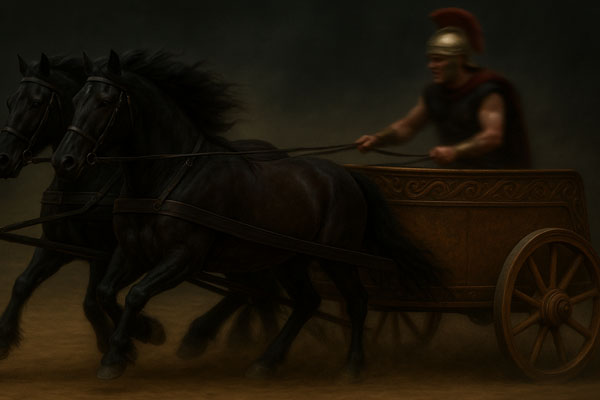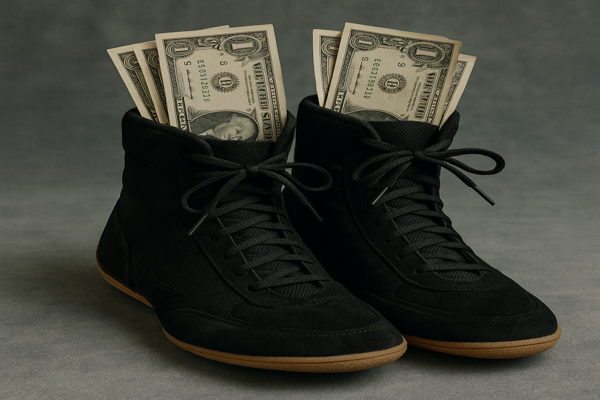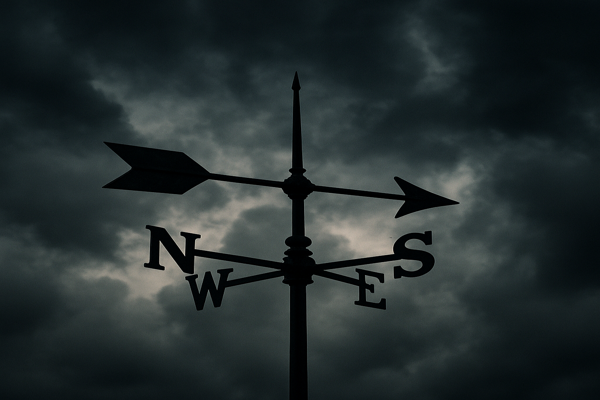When my dad announced he'd found us three horses for free, Mom's first question was, "What's wrong with them?"
It was a reasonable question. In rural Kansas, people don't give away horses unless they're either dying, dangerous, or possibly possessed. But Dad was already lost in visions of his children galloping across the prairie like something out of a Louis L'Amour novel.
"Nothing's wrong with them," he insisted over dinner, gesturing with his fork like a conductor. "Earl Goltl just can't take care of them anymore. He's getting old. Wants them to go to a good family."
"And how exactly," Mom asked in her dangerous quiet voice, "are we getting three horses from Earl's farm to Colby?"
Dad's grin never wavered. In fact, it got bigger. "I have a plan."
In the Murray family, "I have a plan" ranked right up there with "watch this" and "it'll be fine" in the hierarchy of phrases that preceded disaster.
The "Plan"
The next morning, we stood staring at Dad's solution: one of his flatbed landscaping trailers, now cleared of mowers and equipment. It was designed for hauling brush and branches, with a flat wooden platform and absolutely nothing—and I cannot stress this enough—NOTHING to prevent a thousand-pound animal from simply stepping off the edge.
"Jim," Mom said, each word carefully measured, "you cannot be serious."
"It'll work," Dad insisted, gathering ropes with the confidence of someone who'd definitely never transported horses before. "We'll go slow."
"Slow?" Mom's voice climbed an octave. "It's FORTY-FIVE MILES. On a flatbed trailer. With no sides. What's to stop them from jumping off?"
"They won't jump," Dad said with the certainty of someone who'd apparently had a personal conversation with the horses about their travel preferences. "Horses are smart. They'll know to stay put."
This was based on absolutely no evidence whatsoever, but Dad said it with such conviction that even I, at ten years old, almost believed him.
Meeting the Horses
The drive to Earl's farm was an adventure in itself. Dad turned onto what appeared to be less a road and more a suggestion of where a road might go if it were feeling ambitious. The Oldsmobile bounced over ruts and rocks while Mom clutched the door handle, muttering what sounded like either prayers or curse words.
"Earl said to cut through the pasture," Dad explained cheerfully.
What Earl had failed to mention was that this pasture was currently occupied by curious cattle. Within moments, we were surrounded by cows who'd apparently mistaken our car for the world's largest salt lick.
"They think the car is food!" Matt shrieked with delight as a cow's massive tongue slurped across his window.
"They're cleaning it," Dad corrected, still driving at approximately 2 mph through the bovine car wash. "The salt from the winter roads is still on the paint."
One particularly ambitious cow tried to lick the roof, stretching its neck at an impossible angle. Mom made a sound that fell somewhere between a whimper and a growl.
When we finally reached Earl's place, the horses made everything else fade into background noise. Three Camarillo Whites stood in the corral, looking like something out of a fairy tale. They practically glowed in the afternoon sun.
Earl introduced them: Sugar, the boss mare with opinions about everything; Pella, sweet and patient as a saint; and Star, the youngster with mischief in his eyes.
"Free horses," Mom whispered, already falling under their spell. "What could possibly go wrong?"
The Loading Process
If you've never watched a 70-year-old farmer and a landscaper try to convince three horses to step onto a flatbed trailer using only enthusiasm and rope, you've missed one of life's great comedies.
"Just walk them up," Earl suggested, as if horses regularly boarded vehicles specifically designed NOT to carry horses.
"Right up the ramp," Dad agreed.
"What ramp?" I asked.
They looked at each other, then at the trailer, which sat a good three feet off the ground.
"We'll lift them," Dad decided.
Mom walked back to the car and got in, apparently deciding she couldn't watch whatever was about to happen.
What followed was perhaps the most unlikely horse loading in the history of equine transport. Using a combination of boards, persuasion, treats, and what I'm pretty sure was prayer, they somehow got Sugar to step up. She looked deeply offended by the entire process but stood on the trailer with the dignity of a queen forced to ride public transportation.
Pella followed with some encouragement, apparently deciding that wherever Sugar went, she'd follow, even if it was onto what looked like a sacrificial platform.
Star required the combined efforts of Dad, Earl, me, and Melissa pushing from behind while Matt waved hay in front of his nose like some kind of equine hypnotist.
The Web of Rope
Once all three horses were aboard, Dad began creating what can only be described as a spider web designed by someone who'd heard of spider webs but had never actually seen one. Ropes crisscrossed the trailer in patterns that defied both logic and physics.
"Is that going to hold them?" Melissa asked skeptically.
"It's not meant to hold them," Dad explained, continuing his rope work. "It's meant to suggest boundaries."
"Suggest?" Mom had gotten back out of the car and was staring at the contraption. "Jim, you're suggesting to thousand-pound animals that they shouldn't step off a moving platform?"
"Exactly!" Dad said, missing her tone entirely. "Horses are very responsive to suggestion."
Earl, to his credit, said nothing. He just stood there with the expression of a man who'd seen stranger things, though probably not many.
The Journey Home
Dad drove approximately fifteen miles per hour the entire way home, hazard lights blinking, while a parade of increasingly irritated drivers built up behind us. Every bump in the road made the horses shift, Mom gasp, and us kids press our faces against the back window, reporting on our cargo's status.
"Sugar's eating Pella's tail!" Melissa announced at one point.
"Star looks like he's sleeping!" Matt reported. "Can horses sleep standing up?"
"They're fine!" Dad called back, white-knuckling the steering wheel as a semi truck passed us, horn blaring.
One driver pulled alongside at a stop sign, looked at our cargo, shook his head, and said, "That's a new one."
"Thanks!" Dad called back cheerfully, choosing to take it as a compliment.
About halfway home, a state trooper appeared in our rearview mirror. My heart stopped. Surely there were laws against this. Surely we were about to be arrested for horse endangerment or trailer fraud or just terminal stupidity.
The trooper pulled alongside, looked at the horses standing on the flatbed like some kind of rural parade float, looked at Dad, then just shook his head and kept driving.
"See?" Dad said triumphantly. "Even the cops think it's fine!"
"The cop thinks we're beyond help," Mom corrected.
The Miracle Landing
Somehow—and I still don't understand the physics of this—we made it to Colby with all three horses still aboard. They hadn't jumped, fallen, or staged a mutiny. Star had actually fallen asleep, apparently deciding that if he was going to die, he might as well be well-rested for it.
As we pulled into the stable Dad had secretly arranged to rent (because of course he'd arranged it before telling Mom we were getting horses), people came out to witness what one man called "either the bravest or stupidest thing I've ever seen."
"Why not both?" Dad replied cheerfully, already working on untying his rope web.
The horses stepped down from the trailer with expressions that clearly said, "We are never trusting you people again." But they were safe. They were ours. And we had a story that would be told at every family gathering for the next thirty years.
The Lesson
Mom watched as we led our new horses into their stalls, her face softening despite everything. "Jim Murray," she said, "if you ever transport horses on a flatbed trailer again, I will... I will..."
"You'll what?" Dad asked, grinning as Pella nuzzled his shoulder.
She looked at the horses, then at us kids practically glowing with joy, then back at Dad. "I'll make you explain it to the insurance company."
But she was smiling.
Looking back now, years after Dad passed, I realize that flatbed trailer ride was everything about him in one insane afternoon. It was dangerous, probably illegal, definitely inadvisable, and absolutely unforgettable. He saw the world not as a series of rules and limitations, but as a place where anything was possible if you had enough rope and optimism.
Did we deserve to make it home safely? Probably not.
Should anyone ever attempt to replicate this? Absolutely not.
But did it work? Somehow, yes.
"Sometimes the difference between disaster and adventure is just arriving alive with a good story. We spent our entire journey balanced between catastrophe and triumph, held together by nothing more than poorly-tied ropes and my father's absolute conviction that everything would work out."
It usually did. Not because it should have, but because Dad believed it would, and somehow his belief was strong enough to carry three horses, forty-five miles, on a flatbed trailer with nothing but rope and pure Murray determination.
The horses lived with us for years after that, giving us countless adventures and a few more trips on questionable trailers. But none quite matched the insanity of that first ride home—three horses standing on a landscaping trailer, my dad driving fifteen miles per hour down Highway 24, and my mom alternating between prayers and planning Dad's funeral.
Just another Tuesday in the Murray family.



